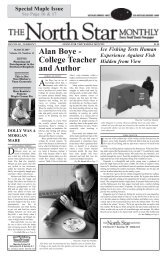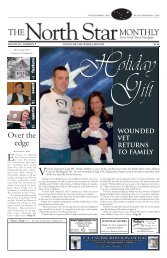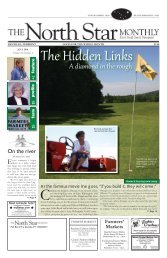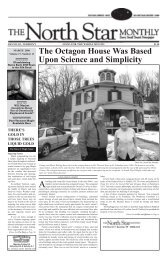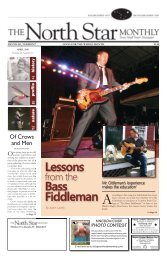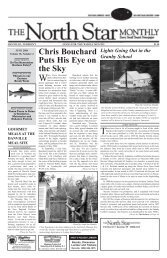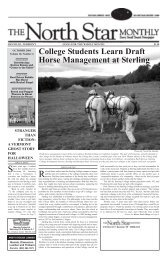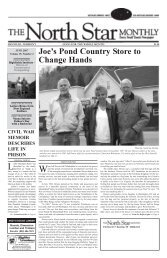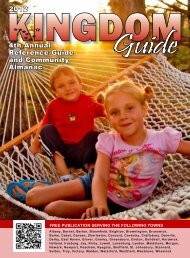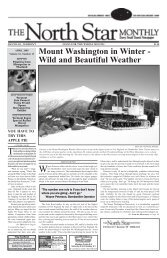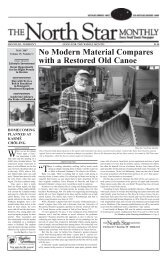Walking the llama trail - The North Star Monthly
Walking the llama trail - The North Star Monthly
Walking the llama trail - The North Star Monthly
- No tags were found...
Create successful ePaper yourself
Turn your PDF publications into a flip-book with our unique Google optimized e-Paper software.
6 NOVEMBER 2009 THE NORTH STAR MONTHLYA man can lose everything, but he can’t lose his mind’John Sayarath’s life story is an inspiration to more than just his studentsBY JUSTIN LAVELYake something of yourselves.“MDon’t waste your lives.”Dr. John Sayarath often finds himselfimparting this message to his teenage students.He teaches science at St. JohnsburyAcademy and his own life story is enoughto inspire <strong>the</strong> uninspired.Despite not setting foot in <strong>the</strong> U.S. untilhe was 15 years old, he has a Bachelor’s Degreefrom Harvard University, a PhD from<strong>the</strong> St. Mat<strong>the</strong>ws University School of Medicine,a Masters in Education from LyndonState College, he speaks five languages andis a superb tennis player. It’s hard to imagine,but <strong>the</strong>se accomplishments pale in comparisonto what he overcame before he evengot here.As he prepares to tell <strong>the</strong> story of hischildhood, he grabs two plastic chairs fromlab tables in his Streeter Hall classroom andsets <strong>the</strong>m invitingly beside his desk. As hebegins his story, he almost sounds surprisedthat local readers may find it interesting. Heis very unassuming and everything he saysseems profoundly genuine.He was born in Laos in 1960, just before<strong>the</strong> Vietnam War erupted, as a member of<strong>the</strong> Kmhmu tribe. <strong>The</strong> Kmhmu, much likeNative Americans, are <strong>the</strong> indigenous inhabitantsof Laos. Growing up in a small village,John was treated with a great deal ofrespect as <strong>the</strong> son of a shaman. Shamans aremedicine men, using <strong>the</strong>ir connection with<strong>the</strong> spirit world to care for o<strong>the</strong>rs, but when<strong>the</strong> French colonized Laos many nativesswitched to Catholicism and <strong>the</strong> religiousshift led to less activity by <strong>the</strong> shaman. Earlyon, it was clear that John was destined to followin his fa<strong>the</strong>r’s footsteps.“I was born feet first,” he says. “To <strong>the</strong>Kmhmu, that is a sign.” Maybe so, but <strong>the</strong>best fortune teller would have had a hardtimeforecasting <strong>the</strong> bright future that layahead of him.Laos was dragged into <strong>the</strong> Vietnam Warin <strong>the</strong> mid 1960s, and <strong>the</strong> eastern parts of<strong>the</strong> country were invaded and occupied by<strong>the</strong> <strong>North</strong> Vietnamese Army (NVA). In response,<strong>the</strong> United States initiated a bombingcampaign against <strong>the</strong> <strong>North</strong> Vietnamese.It was reported that Laos was hit by an averageof one B-52 bomb load every eightminutes, 24 hours a day, between 1964 and1973. U.S. bombers dropped more ordinanceon Laos in this period than wasdropped during <strong>the</strong> World War II. Laosholds <strong>the</strong> dubious distinction of being <strong>the</strong>most bombed country in <strong>the</strong> world.When John was very young, his fa<strong>the</strong>rwas killed during one of <strong>the</strong> raids. John meta French priest who first introduced him towestern medicine. <strong>The</strong> two would travel toge<strong>the</strong>ron foot or by horse from village tovillage treating locals and foreigners. <strong>The</strong>ymade stops everywhere from leper coloniesto military barracks. One day, while <strong>the</strong>priest walked around his church reciting <strong>the</strong>Bible, he was shot by a communist soldier.John was taken away to an orphanage.His first few years in <strong>the</strong> orphanage werehis most trying. Because he was a memberof Kmhmu, regarded by many in Laos assecond class citizens, he was treated “verybadly” by <strong>the</strong> o<strong>the</strong>r children. When thingsseemed to be at <strong>the</strong>ir worst, John met anAmerican couple, <strong>the</strong> Levys, working in <strong>the</strong>orphanage. <strong>The</strong>y would become hisguardians and eventually take him out of <strong>the</strong>orphanage to live in <strong>the</strong>ir home. <strong>The</strong>yworked with him on his English. This reprievewas short lived as <strong>the</strong> invading communistseventually exiled all foreigners,including John’s guardians.John fled <strong>the</strong> country as well, headingeast to central Thailand where he was placedin a refugee camp for <strong>the</strong> next two years.<strong>The</strong> camp was a series of open fields wherethousands of fleeing Laotians were confinedby <strong>the</strong> Thai soldiers. While he was<strong>the</strong>re, John discovered that <strong>the</strong> Levys hadsettled in nor<strong>the</strong>rn Thailand. He beganthinking of a way to escape <strong>the</strong> camp andreconnect with his guardians in hopes ofleaving <strong>the</strong> region completely.Camp guards would only allow him toleave during <strong>the</strong> day so he could work for alocal sugar cane and rice farmer earning $2a week. He became friendly with <strong>the</strong>farmer’s son and decided to disguise himselfas a Thai student and use his friend’sstudent identification to escape. One day heand ano<strong>the</strong>r refugee asked <strong>the</strong> guards if <strong>the</strong>ycould leave <strong>the</strong> camp to visit <strong>the</strong> library. <strong>The</strong>o<strong>the</strong>r man was told no because he had asuitcase. John, with just <strong>the</strong> clo<strong>the</strong>s on hisback, was allowed to leave. He caught a seriesof buses across <strong>the</strong> country as he triedto reach <strong>the</strong> Levys. Occasionally, his bus wasboarded by Thai soldiers who would askhim for his identification. With shakinghands he remembers handing <strong>the</strong>m <strong>the</strong> borrowedID and hoping <strong>the</strong>y didn’t ask himany questions.“All <strong>the</strong>y had to do was ask me questionsand <strong>the</strong>y would have been able to tell by myaccent that I’m not Thai,” he says. “I wasvery lucky. If <strong>the</strong>y caught me <strong>the</strong>y wouldthrow me in jail and do who knows whatwith me.”“<strong>The</strong> first time <strong>the</strong> bus stopped in atown and a soldier came into <strong>the</strong> bus, hewalked around checking all of <strong>the</strong> IDs.<strong>The</strong>re was an old man sitting by me, and Iwas closest to <strong>the</strong> window. I was so nervous,and when <strong>the</strong> soldier asked me for my ID Ijust handed it over through <strong>the</strong> old man. Henever asked me a question.”After being reunited with <strong>the</strong> Levys, <strong>the</strong>ydecided to return to <strong>the</strong> U.S. after a 27-yearabsence because of Mr. Levy’s failing health.Since <strong>the</strong>y wanted to stop in Israel on <strong>the</strong>way back, <strong>the</strong>y asked John to travel with afellow professor to Hazleton, Penn., andwait <strong>the</strong>re for <strong>the</strong>ir return. One month after<strong>the</strong> Levy’s returned, Mr. Levy died at <strong>the</strong> ageof 50, and Mrs. Levy became very ill. <strong>The</strong>yasked John to continue staying in Hazleton.Mrs. Levy died a year later.John was put into 11th grade, and he



